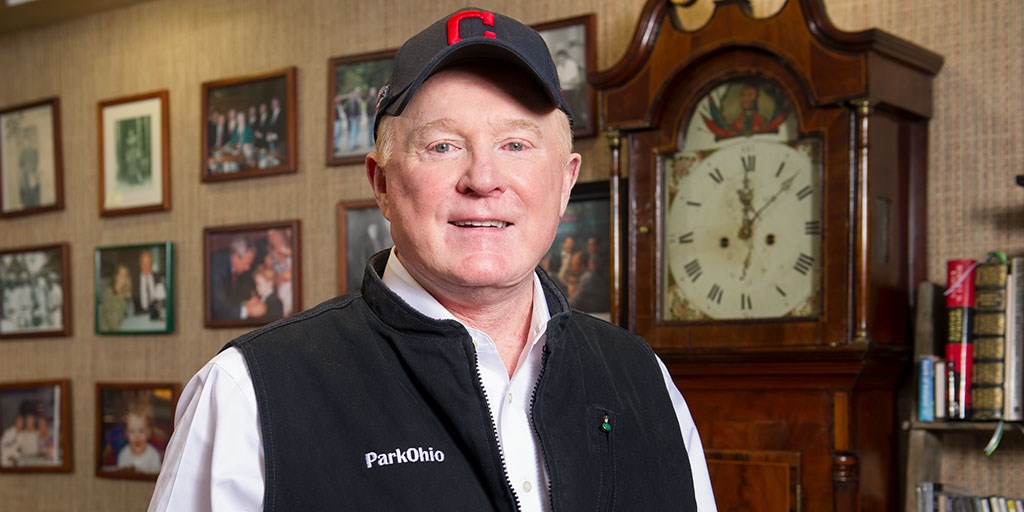For Edward F. Crawford, it all began with an idea to manufacture steel pails. Crawford made up for his lack of experience with a tenacity that convinced others he was a man who could get things done.
“I went to a couple prospective customers and I said, ‘Look, if I can put together a steel plant, would you buy from me?’” he recalls. “One of them said, ‘Of course, but where are you going to get the money?’ I said, ‘Well, I haven’t figured that out yet. But I’m working on it.’”
Cleveland Steel Container Corp. remains in business to this day, marketing to Fortune 500 companies, as well as family-owned businesses. Crawford walked away from that company in the early 1970s to start The Crawford Group. Twenty years later he joined ParkOhio Holdings Corp. ParkOhio has completed nearly 90 acquisitions, which just scratches the surface of the number of deals Crawford has done throughout his career.
We spoke with Crawford for our first Dealmakers Live video, but we had to leave a lot on the cutting room floor. Below, he offers his thoughts on losing his first business, the value he places on people and dealing with rejection.
Starting out
It took me about a month to convince a couple steel suppliers to do business with us. We didn’t have any credit, so these were secondary steel companies. But I was having fun and they thought we were pretty courageous and were entrepreneurial in spirit. I said, ‘It’s simple; just give me half a truckload of steel on Monday. I’ll take it, we’ll convert it to pails; I’ll deliver the pails on Friday, I’ll collect the money and I’ll come back and I’ll pay you on Monday, and pay the employees.’ If you don’t have money to start with — it’s not in your family — you’ve got to develop access to it. We have worked very hard through three careers to continue to expand our access to capital and get the support of people that would invest in us.
I lost control of that company because we kept selling stock. My first career was 1962 to 1972 at Cleveland Steel Container Corp., which is still in business today and is run by one of my original partners. I wanted to switch the company from making steel pails to plastic pails, so we had to raise capital. Once we raised the capital to do that, things had gone so well, the investors started thinking about selling the company. I got frustrated with that because it was like they were selling my friend, my baby. I walked out on the company. I just didn’t want to be there anymore. I was leaving behind a lot of value.
I was encouraged by Fred Lennon, a very successful businessman in Cleveland.He said, ‘You helped create it, now stop thinking about that. You have the ability and the talent to do this again. So don’t think of going back, don’t think of being part of it. Start all over.’ He was absolutely right. Why would I want to be a minority partner and struggle with that? The way to prove it to yourself and to everyone is to be successful again.
Dealmaking
Think about a group of people in a square room. There are some people in those corners with great ideas that won’t come to the center because they don’t want the rejection. That’s where all the action is. That’s where all the danger is. That’s where all the deals are done. But they want to stay in the corner, even though they have the ideas. They just don’t want to take that skill in the game. There are many reasons why people don’t do it. For me, it seemed like I had no choice.
Every acquisition starts with the same question. When I’m sitting with someone and they’re selling the company, the first thing I want to know is why am I so lucky that you’re selling me your company? If they can’t make it clear why they are selling the company, there is something wrong. I’ve bought a lot of companies, but I’ve also walked out of a lot of rooms when I got the wrong answer. If they’re selling and the owner is getting out, the question is who is going to be there? There has to be a reason. If you’re not armed with that information, you can’t get to the operating people to ask the right questions.
The worst thing you can do when you are selling your company is to do business with people who are just bringing money to the table. We do bring money, but we bring talent, recovery and working people. We understand how a company operates. We have a team and they are all very good at one thing. So our motives and the concept of how we approach finding deals, developing deals and pricing deals supports that goal.
The Last Word
Becoming an entrepreneur and a dealmaker is not about taking risks. It’s about being able to handle rejection. I got a lot of no’s in my life. I’ve been self-employed for over 50 years, so I never worked for anyone else. I had the dream. But the ability to handle rejection is critical, even in your family. The ones who want you to succeed the most are afraid of you losing. When somebody comes at me with no, no, no, it doesn’t deflate me, put me into a panic or make me lose confidence. It makes me stronger. I consider it a source of energy.
How to reach:ParkOhio Holdings Corp., www.pkoh.com




